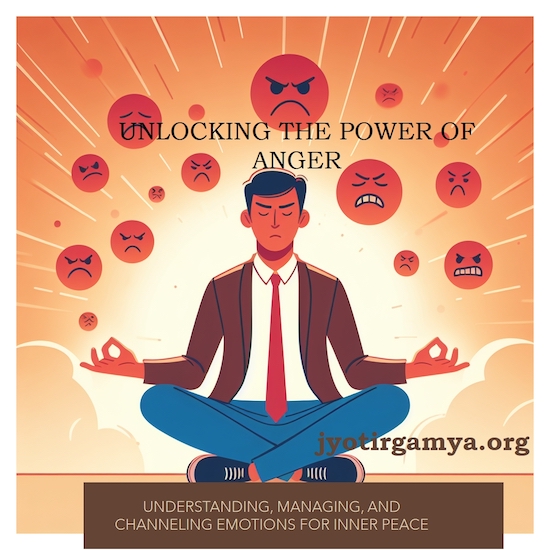Unlocking the Power of Anger: Understanding, Managing, and Channeling Emotions for Inner Peace
Story : Quitting, the only Option
A scorpion entered a carpentry shop, and as she slithered around, she tripped over a saw and received a minor cut.
“Ma’am, I’m relaxing after a long day of work. I apologize. Please proceed!”, the saw conveyed.

The scorpion was offended and enraged because she perceived the saw as undermining her personal ego(venomous tail). She liked the idea of vengeance and planned to teach the saw a lesson.
She used her tail to sting one of the saw teeth while doing so, she severely injured herself.

The saw once again requested the scorpion to move aside and go about her business.
But the scorpion always saw herself as the best and unique from others. The statements from the saw were making her feel mediocre and basic.
She always felt she should get her way, but her plans were thwarted. This infuriated the scorpion. As a result, the scorpion decided to sting the rest teeth.
The other instruments were silent spectators to the scorpion’s act.
When the carpenter entered his workshop the following morning, he was surprised to find a dead scorpion.
There is a strong message here.
In our haste to get revenge, we may inadvertently inflict even more suffering on ourselves.

The negative energy we carry around when we hold on to resentments only causes us to suffer, never the person we want to suffer.
Fighting back will not lead to victory.
It is always better to let go of negative feelings toward others and instead focus on creating the best life we can for ourselves.
Introduction
This article delves into the complexities of anger, going beyond the surface-level emotion to explore its hidden causes and consequences. It aims to help readers understand their anger, navigate it with greater control, and ultimately cultivate inner peace. The article promises personal well-being and a ripple effect of positive global change.

Expert Opinion
Anger? A clear word is recognizable to 99% of the human population. However, anger is one of the most misunderstood emotions in society today.
More often than not, anger is a surface-level emotion representing something a bit more complex. For example, when we become angry, we could feel embarrassed/insecure and offended simultaneously, but what people see on the surface is ‘anger.’
How would you approach someone you perceive to be ‘angry’ compared to someone you know is feeling embarrassed/ insecure and offended?
A little differently.
Ego
We can become outraged when our ego has somehow been damaged or attacked. Therefore, if you are experiencing a lot of anger, I urge you to ask yourself, “What button is this person/situation triggering within me?”. Suppose the angry individual (in real-time) can even get to this questioning stage. In that case, they demonstrate a level of emotional self-regulation that 99% of the population is missing (myself included).
What about the person exposed to the anger?
I would always urge individuals not to judge someone angry immediately and take it for face value. Try putting yourselves in their shoes as much as you can before making your final assessment of that individual.
If you imagine the onion scenario, pulling back more layers of a surface-level emotion will allow you to understand the root cause of the anger (just like an onion, there may be tears). However, once this is established, a much more constructive resolution can be reached to move beyond anger.
Why would you put all your effort into the above? (especially when you are not the aggressor or experiencing anger per se).
Repeating the above actions when you are both experiencing and exposed to anger will help you be less affected by this powerful emotion in the future. Ultimately, this will allow you to regulate yourself emotionally better, instilling a new level of contentment.
I cautioned using the word ‘happy’ above as I do not feel that reacting less will automatically equal happiness. On the other hand, individuals stuck internally running over past events that made them angry will continue to feel higher frequencies of sadness in their present-day lives.
Moving on from anger is crucial to avoiding monsters being created internally that can eat you alive.
What monsters? The Lochness monster? Bigfoot? Godzilla?
No silly! I am talking about another emotion called resentment. Feeling resentful towards either people or the world can have dire consequences for everyone involved. A resentful individual can take extreme measures to “right a wrong.”
Think of a mass school shooting where the narrative in the media was, “This teenager was exposed to violence through video games.”
If I were a betting man, I would bet that someone who put the time and effort to orchestrate a mass school shooting was more than just “angry” or repeating acts of extreme violence. I would bet they were highly resentful of the world and felt lonely, and now we’re going to “right a wrong.”
Anger management is one of the most common problems in today’s society, with the fewest successful treatment modalities. Suppose you can evidence you own an anger management program that has been studied within the academic literature to do just that successfully. In that case, there will be no shortage of demand for this.
Anger is often associated with negative connotations, and rightly so. If you are always angry, no one will want to be around you. If you have a reputation for angry outbursts for no apparent reason, will you be invited to the party? What about individuals carrying trauma from exposure to anger in different stages of their lives? Makes sense why people wouldn’t be excited to be around you…
Well, what can be done about this?
First, ask yourself, Is this thing I am angry about within my control? If it is not, focus on the things you can control, or you will be stuck trying to fix the world rather than yourself.
Secondly, there are only so many things in the world you can care about. Anger can be highly draining while excess amounts of adrenalin try to find a home within your body. So, frequent periods of emotional instability can have dire physical outcomes as well as mental outcomes.
Thirdly, ask yourself what will be achieved if you experience an angry outburst. It might feel good or like a weight has been lifted off your shoulders… However, one moment of enjoyable anger can create a lifetime of awkwardness (pay particular attention to this in the work setting). Your employer has less motivation to accept your angry outburst than, say, family/friends or your partner.
You are reading this thinking, ok, so anger is just misunderstood, and if we all have greater empathy in all components of our life, everything would be great. Wrong. There is a time and a place for anger.
What if someone nearly killed your child because instead of focusing on the road, they were scrolling through social media on their phone? A pretty legitimate reason to display anger?
What if someone is knowingly causing you harm?
After reading this, I will leave you with two quotes I hope you will understand.
“You need to rise above this sh*t.”
“You are never too old to get punched in the face.”
Conclusion
Anger: misunderstood, powerful, sometimes justified. Digging deeper reveals complex layers - ego, resentment, and potential monsters like hurt and loneliness.
Ignoring it breeds isolation, and outbursts scar futures. But blind rage isn’t the answer.
Focus on what you control. Conserve your emotional energy. Choose anger wisely. It’s a tool, not a tyrant. Wield it with empathy, understanding, and respect.
Remember, anger isn’t just about you. It’s about creating a world where everyone feels safe, understood, and valued. Let’s choose it wisely together.
About the Author
Mark Bale is an experienced mental health professional with roles at Vancouver Coastal Health and Fraser Health Authority. He has also worked as a Data Analyst at Central 1 Credit Union and as an Addictions Worker at North Ayrshire Drug and Alcohol Recovery Service. Mark holds an MSc in Research Methods in Psychological Sciences from the University of Glasgow.

Additionally, he worked as a Prime Brokerage Analyst at Morgan Stanley. Mark is known for his commitment to client-centered care, recovery-focused treatment, and continuous improvement in the field of mental health. He has also contributed to mental health blogs, sharing his expertise.
Related Articles
From Fury to Failure: The importance of Addressing Anger Issues
The Challenge of Anger Management
How to Avoid Relationship Problems
If you think someone would benefit from the article, please do share it with them.
Want to stay connected? Here’s our twitter.
Or subscribe to our monthly newsletter containing tools for body, mind, and goal.